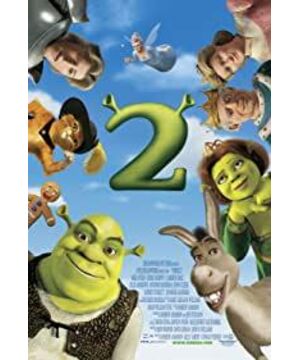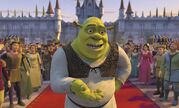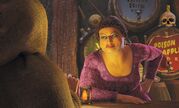I haven't watched the third episode of Shrek yet, but want to revisit the first two episodes.
Shrek I and II are well-received masterpieces by DreamWorks in recent years. What is rare is that the sequel can still maintain the level of the first episode. The first episode is a great overthrow of a fairy tale. It tells a king who wants to find a beautiful princess for himself as a princess, so he recruits warriors to rescue Princess Feianna who is locked on the tower. On the other hand, the monster Shrek who lives in the swamp finds that his home is filled with foreign fairy tale characters for no reason. It turns out that they were rushed here by the king. He wanted to take back his swamp, so he came to the fairy tale kingdom with his new friend—the rapist Donkey, and unexpectedly accepted the task of saving the princess by accident. Slicker even developed feelings with the princess. It turned out that the princess was a beauty during the day, but turned into a monster at night. The two overcame their misunderstandings and feelings of inferiority. They kissed each other, and Fei Anna became a monster from then on. It also matches the monster.
"Sreica I" has changed the prince and princess routine in fairy tales, which is quite refreshing, but in fact, it still emphasizes the problem of "right registration" in marriage, mainly because of the appearance of the right registration. The sequel goes beyond the ending of "living together happily ever after" and describes the process of "seeing parents" after marriage.
When the two returned from their honeymoon, they received a letter from Fei Anna's parents, inviting the princess and her husband to return to China to participate in the wedding party. This broke the disproportionality between the two of them. Although Fei Anna looked ugly, she was always a princess, but Slicka was a veritable monster. He also realized this, and he was extremely reluctant to accompany the princess home, but at the insistence of his wife, he finally had to set off.
If the conflict between the two in the first episode lies in their inferiority in appearance, the sequel emphasizes the disparity in identity. Slicker always strongly opposed the princess's going home because he could escape by staying in the swamp. Once he returned to the kingdom, he had to face his wife's family and the fact that his wife was a royal family. Feanna’s father, King Charlotte, strongly opposed this marriage. Although there was selfishness and the pressure of the fairy godmother, there was no denying that the princess and the monster did not match. Although it is still a fairy tale ending in the end, true love overcomes the barrier of identity, but I feel that in reality, there may not be such a happy ending.
Falling in love may be a matter of two people, but marriage is definitely not. It may be better in Western countries. The family is more independent. If the son-in-law and the father-in-law cannot see each other, like Shilijia and Charlotte, the two live in different places and do not interact with each other. Chinese people value family affection and have a very strong family concept. If two people love each other, if they do not get the recognition and blessing of the family, they will often feel sad, and even break up after they can't bear the pressure.
In China, the marriage of two people is equal to the marriage of two families. It can also be seen from a series of procedures: meeting the parents, making appointments, preparing for the wedding, placing wine for drinks, and often leaving relatives after marriage. Once married, the spouse Your relatives are also your relatives, and your spouse's family is also yours, so you must also participate in the spouse's family activities, otherwise it is likely to be intriguing.
Of course, family activities are not necessarily all torture, but once it becomes a responsibility, it will inevitably be prohibitive, especially for gatherings of elders. It is unavoidable to step by step, and it takes a lot of effort to identify the generation. In this respect, I admire Western family relationships. In-laws are equal. For example, a son-in-law and a father-in-law can meet in the same generation, call their names directly, and get along with friends. In this way, the relationship between people is much simpler, and it is much more natural to get along with each other.
Like the relationship between Shrek and King Charlotte, I found it very fresh when I first saw it. Charlotte looked down on Shirega's identity. Shirega was troubled by inferiority complex, and he was also tit-for-tat everywhere, especially the quarrel at the first party dinner, which was a classic. In the eyes of Westerners, this is just a anger between two men. If in China, this is the case for the elders? It's really rebellious.
But in any case, the familial nature in marriage is in fact both at home and abroad, otherwise Fei Anna would not insist on taking her husband back to see her parents. People are already group animals, and they can't help but hope to get the approval of their relatives and friends around them. The collapse of "fairy tales" in reality may also originate from this. The marriage of disparity in status has always been difficult to get the recognition of the two families. Therefore, it is not unreasonable to say that the family is right.
View more about Shrek 2 reviews










